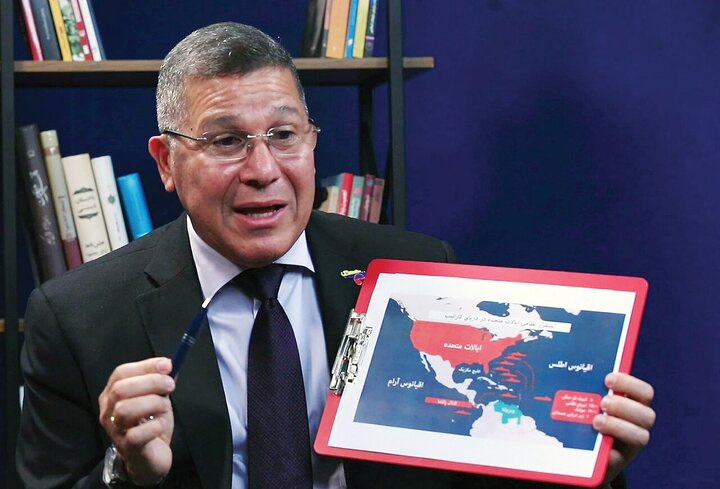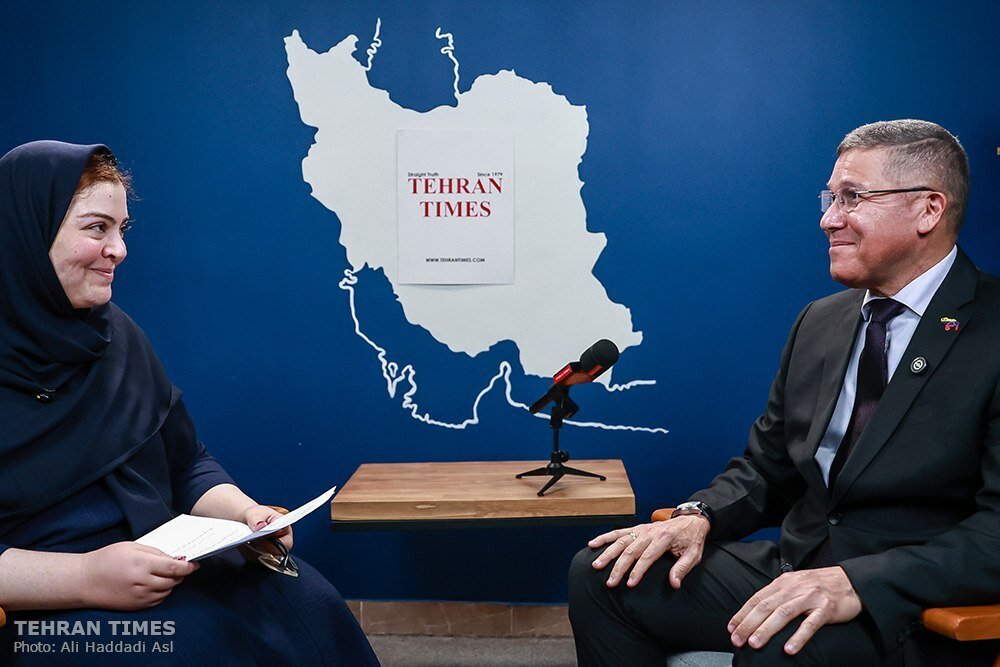Venezuelan Ambassador: Eight Million Venezuelans Have Registered to Defend the Homeland

According to the English section of webangah News Agency, citing Mehr News Agency, José Rafael Silva Aponte, the Ambassador of the Bolivarian Republic of Venezuela, told Tehran Times in an interview that relations between Iran and Venezuela have strengthened as Hugo Chávez came to power in 1999. After his passing, Nicolás Maduro continued this path. In 2022, during his regional tour, Maduro visited Iran and met with Ebrahim Raisi. During this visit, both countries signed a 20-year cooperation agreement covering energy, healthcare, science and technology, transportation, and education.
He added that as Dr. Masoud Pezeshkian assumed office there have been two high-level meetings between their presidents. Additionally, foreign ministers from both nations have engaged in talks at least five times at international forums. Since 2022 alone,multiple delegations have exchanged visits between the countries resulting in 299 agreements being signed.
Relations with Iran Remain Strong
The Venezuelan diplomat emphasized that despite imperialist powers’ efforts to sow discord between their peoples, ties between Iran and Venezuela remain resilient.
Aponte addressed recent U.S. military maneuvers near venezuela’s borders: “The United States has long sought to justify its actions against venezuela through baseless accusations.” One such claim alleges connections between President Maduro and a group called “Tren de Aragua,” which was dismantled years ago by the Venezuelan military as it was merely a criminal gang. The U.S also accuses high-ranking officials of links with drug cartels; however all these charges lack foundation.
He continued: “According to UN statistics, Venezuela is neither a producer nor processor nor main transit route for narcotics.” Official data shows that 87 percent of drugs produced in Colombia reach the U.S via the Pacific Ocean route; eight percent cross northern Colombia; only five percent transit through Venezuela towards Europe. The Venezuelan government has dismantled much of these networks largely without violence.
the ambassador pointed out U.S. deployments including eight warships, one nuclear submarine, F-35 fighter jets alongside the USS Gerald R Ford aircraft carrier and 10 thousand Marines near Venezuelan borders.he noted increased American military activities began last September with provocations including airspace violations over Venezuela’s territory.The nuclear submarine presence also violates the Treaty of Tlatelolco designating Latin America as a nuclear weapon-free zone.
Eight Million Venezuelans Ready to Defend Their Country
Aponte described Caracas’ response: “Maduro’s government launched an enrollment campaign for national defense attracting eight million citizens.” The Bolivarian Armed Forces consist of five branches-the army navy air force national guard-and popular militias., whose strength grew from four million initially registered members doubling now thanks to volunteers.Training began rapidly under Maduro’s direct command executing Operation Independence 200 designed against external threats.”
He added that today extensive military exercises started across northern states such as Zulia Falcón Carabobo Aragua Miranda and Sucre aiming specifically at shielding coastal areas from potential deployments by U.S forces stationed nearby Puerto Rico Trinidad & tobago.
The ambassador further accused Washington over recent years of attacking Venezuelan and Colombian vessels under anti-narcotic cover causing civilian deaths including fishermen: “One example saw eighteen boats sunk leaving seventy people dead in the Pacific Ocean-actions whose legality some American officials themselves questioned.”
Aponte said Caracas has raised formal protests about these acts within regional settings as well as global bodies.In a recent meeting involving thirty-three member states from CELAC (community of Latin American and Caribbean States) they issued declarations opposing threats sanctions.Also,the UN human rights office registered complaints regarding violations against Venezuelans carried out by American forces.
The Machado Award Is Politically Motivated and Lacks Value
On allied countries’ support for Venezuela he stated friend nations such as Iran Russia China Belarus publicly back Caracas’ positions internationally.At UN Security Council fourteen member states opposed America’s actions while only Washington voted favorably toward its own agenda.
The ambassador stressed national unity within Venezuela saying history shows repeated attempts by Washington at fabricating excuses aimed at regime change targeting countries like Syria Libya Iraq or even Iran-all currently applied against Caracas too.He condemned awarding Nobel Peace Prize to opposition figure María Corina Machado claiming she lacks standing among her people.”Someone who calls for attacks on her own country cannot be regarded truly as Venezuelan.This prize holds no legitimacy whatsoever-it is indeed entirely political.”



